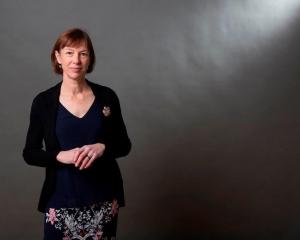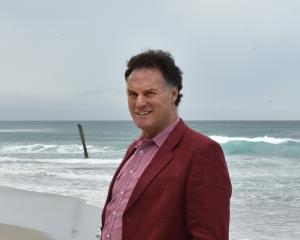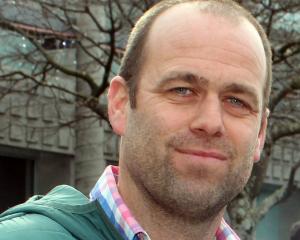Question 1: What barriers do you believe need to be overcome to fully diversify the Queenstown-Lakes economy?
Question 2: What are your goals and priorities for the council?
GAVIN BARTLETT
Ward: Queenstown-Whakatipu.

Age: 50.
Occupation: Professional engineer.
Question 1: Tourism is likely to return to at least pre-Covid levels relatively quickly. Diversifying our economy away from a reliance on tourism will take innovative thinking and considerable time, but is possible. The ability to attract businesses and people in new sectors to our district will be affected by potential barriers such as the cost of living, housing availability and our relatively remote location, issues we are already dealing with as a community.
Question 2: I would like to see QLDC excel in the proactive provision of its services to ratepayers, residents and visitors, with council providing the environment to enable this to happen. I have no specific agenda other than to listen with an open mind to the concerns of the community we represent, in order to be able to provide considered input into council decisions on the complex problems facing our district now and into the future.
BARRY BRUCE
Ward: Wanaka-Upper Clutha.

Age: 69.
Occupation: Business owner.
Question 1: Economic diversification for the Queenstown Lakes district is very important if the region is to become less reliant on tourism and construction as the main economic drivers.
The key shifts to encourage economic diversification are simplified district planning requirements, less central government control of our finance system and support/encouragement for small business start-ups.
Overarching this is the need to encourage a diverse local population and culture that supports and encourages local businesses.
Question 2: I have thoroughly enjoyed my first term in local government.
If re-elected, my goals and priorities are to continue improvements to amenities, such as the lakefront redevelopment.
A key priority is ensuring large infrastructure projects are initiated before the need, not react to a problem after it occurs.
Improved and enlarged sports facilities are essential for our growing community.
Underpinning all of this is the need to protect our amazing environment and character.
OLLY BURKE
Response not received by deadline.
STEVEY CHERNISHOV
Declined to respond.
LYAL COCKS
Ward: Wanaka-Upper Clutha.

Age: 65.
Occupation: Businessman.
Question 1: There are a number of perceived barriers, but the three key ones are: a perception that council’s planning regulations do not encourage potential investors; current staff shortages coupled with a lack of affordable accommodation in a district known for its high cost of living; and underwhelming community buy-in where initial reaction is often "not in my back yard".
Question 2: Firstly, public money needs to be spent prudently on essentials prioritised in a realistic and achievable programme. Don’t bite off more than we can chew; set priorities and get them done within budget. Secondly, remove the burden of decision-making from unaccountable staff. Decisions should be made by informed elected members and shared with communities, so everyone is fully aware of what is being done and why.
TONY DORNER
Response not received by deadline.
DANIJEL DUVNJAK
Response not received by deadline.
CRAIG (FERG) FERGUSON
Ward: Arrowtown-Kawarau.

Age: 64.
Occupation: Broadcaster.
Question 1: A lot of work has been done. It is going to take time and the bringing together of initiatives and plans the community have contributed to. The private sector and government are crucial partners. The economic development unit must be supported to connect, support and enable in all areas of diversification. We have started the journey — we must be an aspirational, liveable destination and that work is not done yet.
Question 2: A lot of healing needs to be done. I will continue to be at the coalface with residents, organisations and communities. I will always be visible and available across the district. We must continue to build on some of the work of previous councils. I am always slow to talk but quick to listen and feel the time has come when community leaders must respond to — "what about us?".
NIKI GLADDING
Ward: Queenstown-Whakatipu.

Age: 47.
Occupation: Councillor.
Question 1: I’m no expert on diversification, but to attract talent I believe we need to overcome our housing issues and the perception that we’re all about tourism. Limiting tourism growth could help with both. It could also make space for investment in other sectors while reducing the district’s emissions. If re-elected, I will keep pushing for a council-facilitated community conversation about tourism growth, including whether we want limits and, if so, how we might implement them.
Question 2: I want to ensure council regains the trust of the community and that local democracy is valued in the Queenstown Lakes district. I also want to ensure we strongly defend local decision-making as the Government’s reforms progress. Biodiversity, reducing transport emissions and keeping electricity supply front of mind will be priorities for me. And I want to ensure smarter investment and emissions reduction through a 10-year-plan process that is based on timely consultation and refreshed priorities.
LISA GUY
Ward: Arrowtown-Kawarau.

Age: 56.
Occupation: Human resource consultant.
Question 1: Finding staff is the single biggest factor limiting growth for Queenstown (chamber business confidence survey). Where do they live when here? We are already a diversified economy that warrants recognition beyond tourism and hospitality. The scope of industries represented here is more than some candidates acknowledge — tech, film, engineering, professional services, consulting, fashion, global-recruitment, design, artists, architecture, construction; all managing worldwide significance from our little global hub. Let’s remove barriers to sustainable, affordable living.
Question 2: I have three priorities: people, productivity and place.
Build communities: Focus on people, be responsive to local conditions, improve places we call home, make living here sustainable; facilitate wellbeing in well places.
Regenerate business: Leave the place better; strengthen economic productivity, boost our workforce, look to changes required to meet future demands, prioritise the best interests of communities.
Look after this place: Engage district-wide, work collaboratively, respect our environment, protect biodiversity; target issues that matter.
NELL HUNTER
Ward: Arrowtown-Kawarau.

Age: 31.
Occupation: Business owner.
Question 1: Queenstown-Lakes is an amazing place to live, attracting internationally renowned people with expertise and connections in many industries. Provided we don’t get in their way, they will build and diversify the Queenstown economy.
The council’s role is to ensure that it is doing the basics right, making sure that new dwellings are being built that can accommodate families and staff and allowing that people can move around in ways that work for them.
Question 2: We need to make sure that Queenstown-Lakes remains a great place to bring up families. The crucial part to that is making sure that key areas are developed in smart ways to provide affordable houses.
We need to ensure that our money is being spent carefully and there are good systems for keeping control on spending.
Council should be focusing on local solutions that are smart and work for people.
ROSS MCCARTHY
Response not received by deadline.
PETER NEWPORT
Response not received by deadline.
QUENTIN SMITH
Ward: Wanaka-Upper Clutha.

Age: 45.
Occupation: Councillor.
Question 1: There is no question that our district needs to diversify its economy away from mass tourism. "Diversify the economy" is a common catchcry, but historically it has proven difficult to impossible, with limited levers to pull to enable it. Council needs to work with community, business, industry and government to develop a diversification strategy that encompasses everything from tax incentives, law charges, support funding, zoning, education, research and most importantly brings the community along on the journey.
Question 2: I want to be part of building a new council that the community trusts and that puts community first. We need to create space in budgets to support community with facilities, sports facilities, environmental projects, tracks and trails and more, things that really affect people’s lifestyles and wellbeing. The biggest challenge of this term will be financial, with rising cost of living impacting residents and escalation of costs in every part of what we do.
CODY TUCKER
Ward: Wanaka-Upper Clutha.

Age: 27.
Occupation: Industrial designer.
Question 1: Embracing change.
Many are preparing to go back to the way things were rather than planning for a shift in focus. Trust in remote work. Remote work has brought diversity, stability and economic opportunity. The more businesses can offer this, the better for QLDC.
Housing and affordability. We have to make it possible for talented minds with new business ideas to survive in this region while they create the businesses that will diversify it.
Question 2: Bring some enthusiasm and creativity to local government. Ensure there is still a pathway for young people to build a life here independent of family help. Help build a vision for Wanaka, Luggate and Hawea that enriches the community and gets people excited about the future.
Inspire innovative ideas to tackle small-scale public transport, climate targets, housing crisis and resilience to disaster events. Improve communication and collaboration between council and residents.
CLAIRE TURNHAM
Ward: Queenstown-Whakatipu.

Age: 55.
Occupation: Advocate, educator, campaigner.
Question 1: Improving accessibility and thinking strategically with a longer-term view. We need to invest wisely in our people as our best resource and build strength in different areas, not just tourism so that we have income from a variety of streams and sources. Queenstown needs to act sustainably and be open to welcoming new technology, innovation and creativity while at the same time ensuring the infrastructure is put in place to support positive economic growth.
Question 2: Making this the best place socially, culturally and economically by ensuring everyone has access to what they need to live well and thrive. Supporting the health and wellbeing for people now and for the generations who follow. Developing understanding of the important issues by listening to, appreciating and responding to needs within our diverse community. Ensuring we have a strong, collective vision and work collaboratively with integrity, empathy, trust and transparency to benefit everyone.
JOHN WELLINGTON
Ward: Wanaka-Upper Clutha.

Age: 62.
Occupation: Tour guide/tourism small business owner.
Question 1: Housing affordability and the provision and funding of infrastructure are the two key barriers to economic diversification.
Housing availability and affordability has already been identified as a critical issue for the Silverlight film studio in Wanaka.
Lack of affordable housing impacts existing businesses and will inhibit innovation and diversification of the economy.
Have a reactive policy towards infrastructure rather than anticipating future growth and providing for it in good time will also hinder diversification.
Question 2: Improve the openness of council and its decision-making.
Support innovative ways to address housing affordability.
Promote proactive rather than reactive planning to ensure the district and especially Wanaka does not repeat Queenstown’s planning and infrastructure mistakes.
Ensure the Wanaka Community Board is empowered and supported by council to become an effective community voice and decision-maker.
Ensure Wanaka ward gets a fair share of resources across all areas of council investment.
MARY WESTON
Response not received by deadline.
MELISSA WHITE
Ward: Arrowtown-Kawarau.

Age: 44.
Occupation: Small business owner.
Question 1: I believe that the largest barrier to diversification of the local economy is around attracting and retaining workers. At present we do not have enough people to fill current vacancies. The cost of living in Queenstown, specifically accommodation, is a massive deterrent to those considering moving or staying long-term. To be able to diversify, we first need to meet the current demand to ensure we can support and sustain diversification.
Question 2: My personal goal and priority for the council is to provide a voice for those who in the past have been under-represented. I live in Lake Hayes Estate, where I run my business and am raising a young family. As this town continues to grow, I want to promote thoughtful decision-making. I want to ensure that decisions made by the council on the future of this region are realistic and not just idealistic.
ESTHER WHITEHEAD
Ward: Queenstown-Whakatipu.

Age: 47.
Occupation: Consultant with Thrivable.design.
Question 1: The biggest barrier to overcome is the assumption that the economy is stand-alone when in reality it depends on the health and resilience of the biosphere. No economic activity will be sustainable through the climate adaptation we face if we do not make this the most important conversation today. New Zealand has relied on a commodity-based economy of tourism and agriculture, so we must consider a sustainable economy that does not depend on climate-sensitive sectors.
Question 2: To employ more climate-aware engineers, planners and communicators. Climate adaptation is not a single issue, it is an issue which must be embedded into every project and policy. Our climate literacy as an organisation and as an electorate needs to lift. My goal is to make all decisions through this lens, to improve climate capability in the district through both my day job and my councillor work. Collaboration is key for equitable solutions.
MATT WONG
Ward: Queenstown-Whakatipu.

Age: 44.
Occupation: Owner-managing director, iFLY Indoor Skydiving Queenstown.
Question 1: Housing affordability, lacking infrastructure and investment, global Covid-19 recovery, attracting technical skills and immigration settings are all barriers to district economic diversification.
We must support co-ordinated innovation, advocate and lobby government, create wraparound infrastructure to support new industries, their employees, and families, for a truly thriving diverse economy.
To succeed in economic diversification, the visitor economy must contribute, supporting and enhancing our district and the community must confidently embrace diversification without adding further issues.
Question 2: As we emerge from a global Covid-19 hangover, my goal is effective leadership through recovery and post-traumatic growth. Setting effective direction to enhance social, environmental, cultural and commercial pillars by strategic forward planning for recovery, growth and crisis resilience.
As a councillor, I will continue community leadership (inside and outside the tent), navigating icebergs, enhancing what we love, collaborating to solve complex issues and making considered decisions that tangibly uplift our people and our place.












